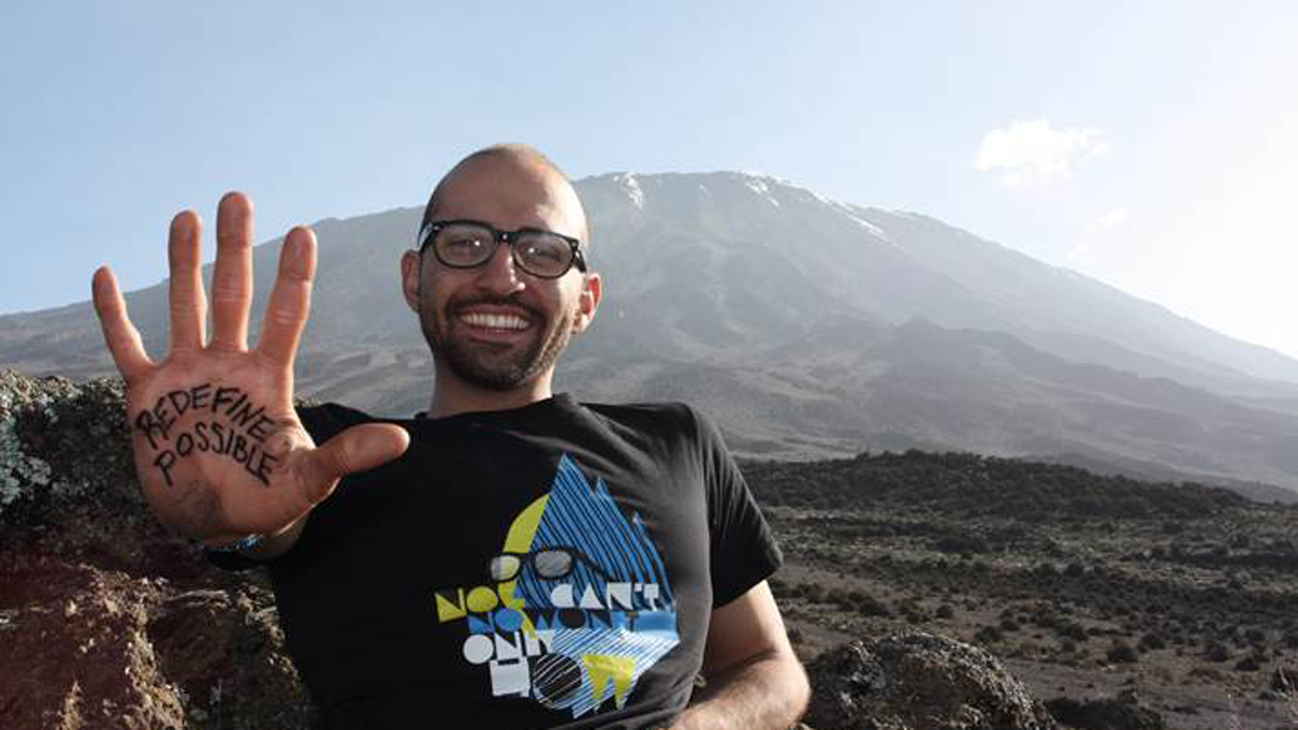From The Globe and Mail:
More than 72 hours after scaling the highest peak in Africa, Spencer West is still trying to scrub the dirt out of the cracks of his hands.
“It’s taken three days to get half of the dirt, my hands were just incredibly dirty,” he says laughing.
Mr. West has just trekked to the peak of Mount Kilimanjaro for the most part by walking on only his hands. He was born with sacral agenesis, an abnormality of the lower spine, causing his legs to be amputated when he was 5.
“When I was a kid,” he recalls, “I was told I would never walk or be a functioning member of society.”
Nearly three decades after doctors issued that warning to him and his parents, he stood towering above the sprawling plains of Africa.
The 31-year-old Mr. West has just returned to a Tanzanian hotel on Kilimanjaro’s lower slope after an exhausting seven-day hike to the 5,895-metre summit.
He made the climb with his two best friends, or “brothers,” as he calls David Johnson and Alex Meers, who work alongside him with Me to We, a social enterprise founded by Marc and Craig Kielburger.
The conquest of Kilimanjaro was part of their bid to raise $750,000 for Free The Children clean-water programs in remote East African communities struck by a devastating drought last year, and for whom they’ve already banked more than half a million dollars.
The men spent a year working with a physical trainer to prepare for a summit that eludes around one-third of the 25,000 hikers who attempt it every year.
Mr. West’s journey to the mountain’s peak began at a salon and spa in Phoenix, where he was working in 2008. A friend had just returned from a Me to We volunteer trip to Free the Children development communities and raved about his experience.
“I was sort of struggling and he said, ‘You should come.’ I thought, ‘Oh, that’s crazy,’ but then the idea started to consume me,” Mr. West says.
So that year he flew to Kenya, joining a school-building effort in the country’s southwest.
There, in an isolated African village, a young girl gave Mr. West what he was looking for with one painfully honest remark. She looked at his 2-foot-7 body in awe.
“I didn’t know something like this could happen to white people, too,” he remembers her telling him.
Ever since, he has clung to that telling moment of childhood candour: “She helped me find my passion.”
That experience also spurred the native of Wyoming to move to Toronto to work with the Kielburgers. As a leadership facilitator and motivational speaker for Me to We, he takes high-school students on trips to Africa, building homes and schools in remote communities.
It was Craig Kielburger, in a passing encounter with Mr. West about a year ago, who planted the seed for his Kilimanjaro expedition, a climb that involves traversing nearly every terrain on earth: from cultivated land to rain forest to moorland to alpine desert and finally the arctic-like summit.
At first, Mr. West tried using open-fingered gloves, but his hands were getting too grimy, so he switched to a thinner, closed pair, before the temperatures plummeted to minus 5 and he put on his winter gloves.
His chance at being among the mountain’s champions took an early hit – a mental blow that, in the end, helped to cement his faith in his own resilience.
He arrived at the base camp expecting to use his wheelchair, souped-up with spiked tires, for half of the climb.
But the state of the terrain made clear that it would be much less than that. “I just thought, ‘Okay, I’m going to have to be walking a lot more than I had expected.’”
In fact, as the threesome approached the summit early Monday, it was Mr. Johnson and Mr. Meers who were hammered by the summit’s most deadly line of defence: altitude sickness – the main reason why, each year, 10 to 20 people perish attempting Kilimanjaro.
They were stricken with headaches and nausea that threatened to derail them on the final leg of their journey. “I got in between them,” Mr. West recalls, “and just said, ‘We’re going to do this as fast or as slow as it takes,’” even though “in my mind I was thinking, ‘Man, I hope we make it.’”
And of course, they did.
At around 11 in the morning, out of breath and out of gas, the three friends and their campaign, dubbed Redefine Possible, had achieved their initial goal: the summit of the world’s highest free-standing mountain.
“My hands were numb,” he recalls, and his companions “were nauseous.”
As soon as they arrived, “we collapsed and cried.”
As for the longterm goal, they are still more than $200,000 short of their fundraising target, Mr. West says, but money is just a part of it.
“At the end of the day, we’re just hoping people use us as a symbol to show that we ultimately define what’s possible in our own lives.”
Mr. West and his friends are resting at the hotel in Moshi before heading to Kenya to lead a group of high-school students in building a school.
As for the tired and sullied limbs that transported him to the top, he’s sure they’ll recover: “My hands are really tough.”
Much like his spirit.

